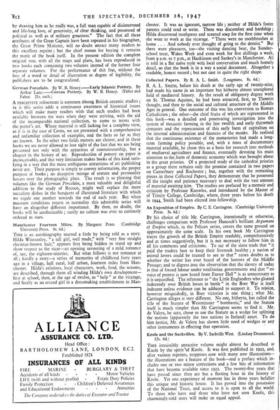An Exposition of Empire. By C. E. Carrington. (Cambridge University
Press. 3s. 6d.)
BY his choice of title Mr. Carrington, intentionally or otherwise, challenges comparison with Professor Hancock's brilliant Argument of Empire which, in the Pelican series, covers the same ground on approximately the same scale. In his own book Mr Carrington traces the growth of the British Empire readably, comprehensively and at times suggestively, but it is not necessary to follow him in all his comments and criticisms. To say of the slave trade that "it paid the traders best to keep their livestock healthy ; a nation of animal lovers could be trusted to see to that" raises doubts as to whether the writer has ever heard of the horrors of the Middle Passage- and to digress into the observation that the slavery of today is that of forced labour under totalitarian governments and that "no voice of protest is now heard from Exeter Hall" is as unnecessary as it is unjustified. The reference to "the Little Englanders who gloated indecently over British losses in battle" in the Boer War is itself indecent unless evidence can be adduced to support it. To rejoice, however misguidedly, in Boer victories is one thing ; what Mr. Carrington alleges is very different. No one, hitherto, has called the title of the Statute of Westminster "bombastic," and the Statute itself is much simpler than Mr Carrington seems to find it. Mr. de Valera, he says, chose to use the Statute as a wedge for splitting the nations (apparently the two nations in Ireland) apart. To do him justice, Mr. de Valera has shown little need of wedges or any other instruments in effecting that operation.






























 Previous page
Previous page